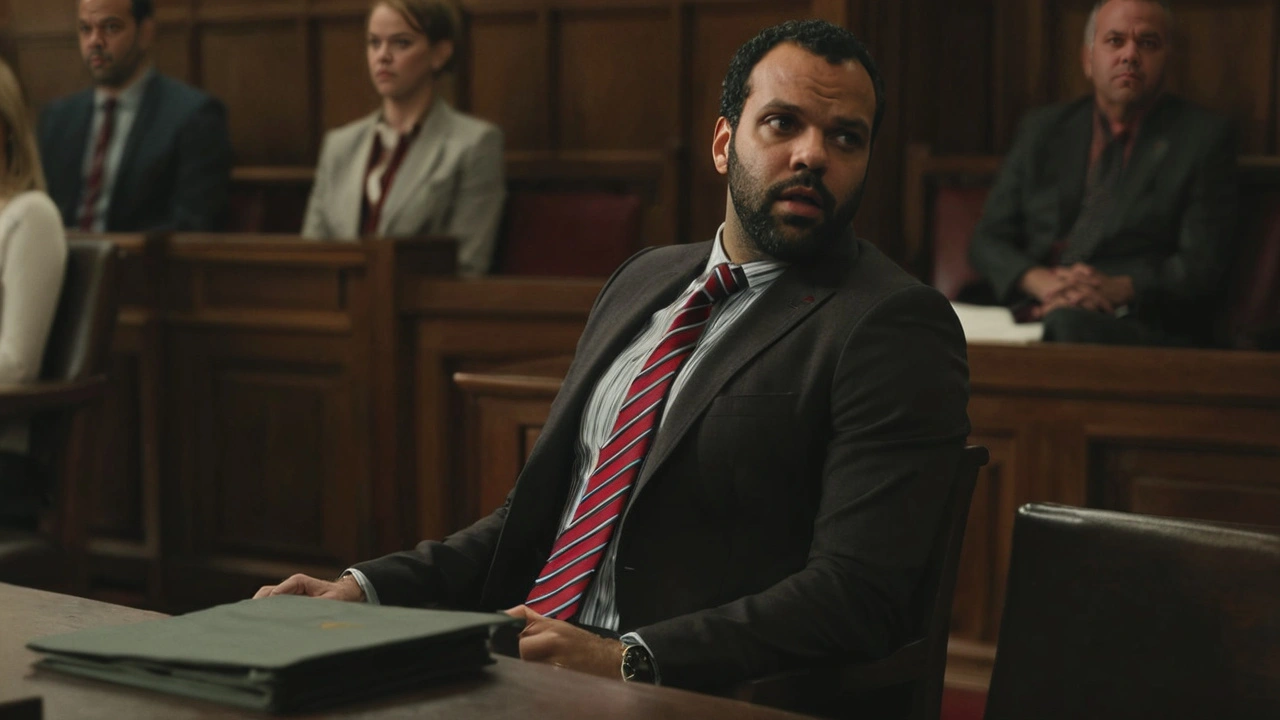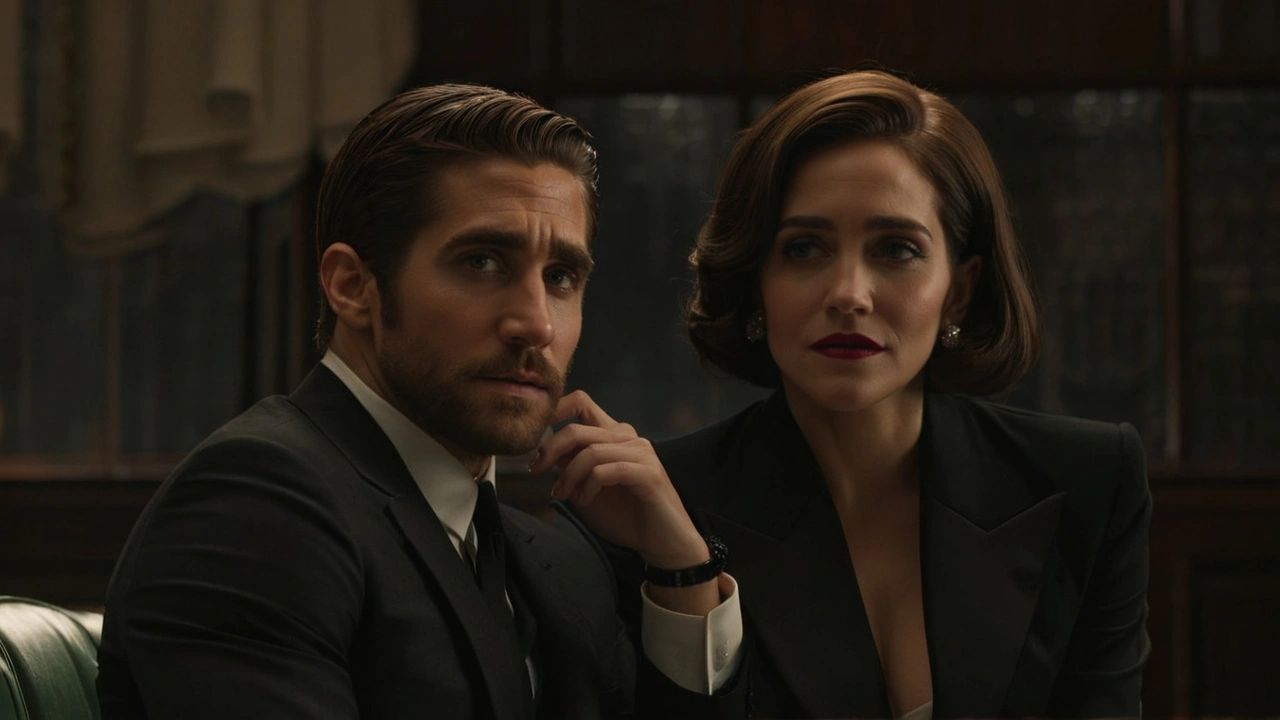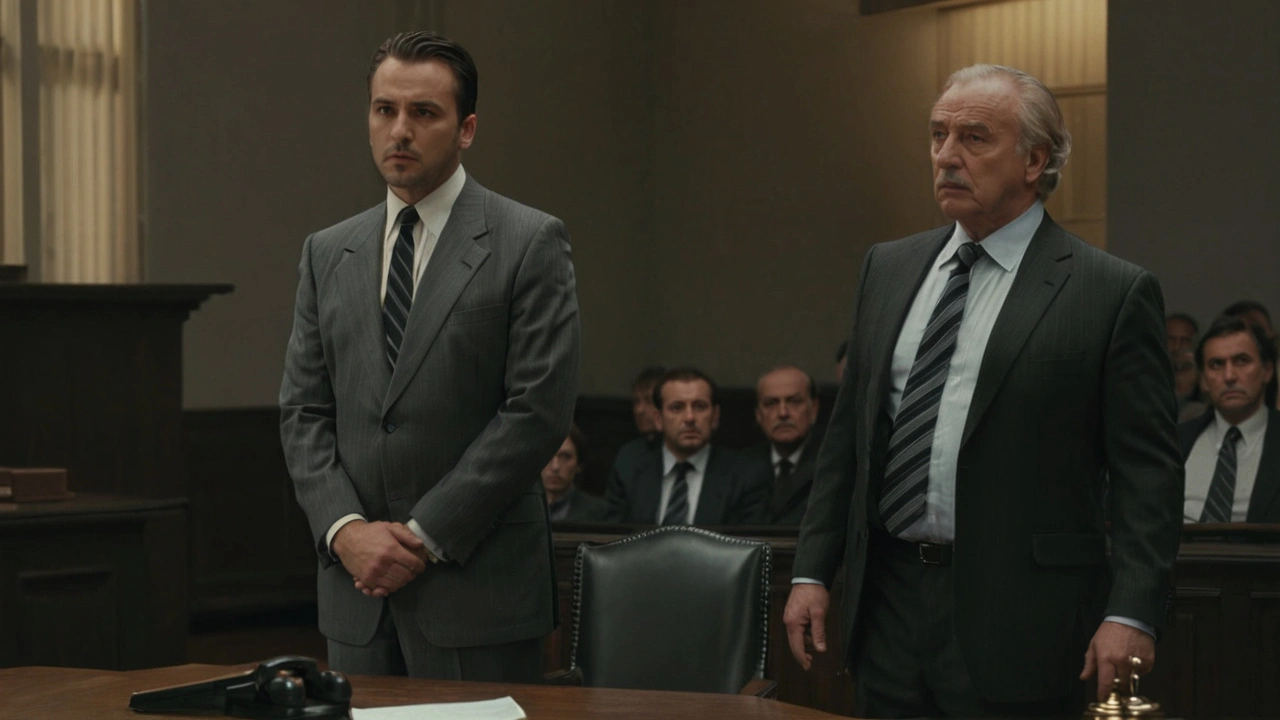O-T Fagbenle on His Silent Scene-Stealing Role in AppleTV+'s 'Presumed Innocent'

O-T Fagbenle on His Silent Scene-Stealing Role in AppleTV+'s 'Presumed Innocent'
In a recent interview with GQ, actor O-T Fagbenle opened up about his intricate role as Nico Della Guardia in the AppleTV+ series Presumed Innocent. Known for his remarkable ability to convey deep emotions without uttering a word, Fagbenle’s portrayal brings a unique depth to the political drama that has captured the audience's attention.
Fagbenle, who draws inspiration from notable actors, cited William Atherton’s character in Ghostbusters as a significant influence for his role in Presumed Innocent. Atherton’s ability to create a character that was both maddeningly self-righteous and strangely appealing fascinated Fagbenle. He aimed to channel a similar duality in Nico Della Guardia, making the character memorable yet complex.
Reflecting on his dynamic chemistry with co-star Peter, Fagbenle shared how their mutual commitment to authenticity and creativity allowed for a collaborative environment on set. He recounted instances where Peter’s dedication to his character pushed Fagbenle to dig deeper into his own role, resulting in richer, more authentic scenes. This synergy between the actors not only enhanced their individual performances but also elevated the overall narrative of the show.
Emphasizing the importance of his theater background, Fagbenle discussed how stage training has equipped him with invaluable skills for character development. In theater, actors often create extensive backstories for their characters, even those not explicitly mentioned in the script. Fagbenle used similar techniques for Nico Della Guardia, crafting a detailed biography to understand his motivations, flaws, and desires. This foundation allowed him to approach each scene with a well-rounded perspective, making his portrayal more believable to the audience.
One of the exercises Fagbenle frequently employs involves envisioning how his character's past experiences shape their present behavior. By doing so, he can portray the subtle nuances of a character’s personality. In the case of Nico Della Guardia, Fagbenle focused on the politician’s ambition and underlying insecurities. These elements, he believes, make Nico not merely a villain but a relatable, multi-dimensional character.
Fagbenle’s acting range is evident when comparing his roles in Loot and Presumed Innocent, showcasing his versatility across different genres. While Loot offered a lighter, more humorous character, Presumed Innocent demanded a more subdued, intense performance. This juxtaposition highlights Fagbenle’s adaptability and skill in embodying diverse personas.
Throughout his conversation with GQ, Fagbenle underscored the significance of embracing a character’s imperfections. He believes that flaws and vulnerabilities are what make a character compelling and relatable. By fully accepting Nico’s darker traits, Fagbenle could bring authenticity to his portrayal, in turn captivating the viewers.
Moreover, Fagbenle touched on the impact of external reactions in shaping his character’s identity. Observing how other characters interact with and respond to Nico helped him refine his performance. These reactions provided insights into how Nico is perceived within the story, which Fagbenle then used to inform his acting choices. This method ensured that his portrayal remained consistent and resonant throughout the series.
As Presumed Innocent continues to gain acclaim, O-T Fagbenle’s contribution stands out not only for his silent scene-stealing moments but also for the profound depth he brings to his character. His approach to acting — a marriage of inspiration, training, and collaboration — serves as a testament to his dedication to the craft, confirming his status as a versatile and talented actor in the industry.
Exploring the Inspirations Behind the Character
Delving deeper into how Fagbenle crafted Nico Della Guardia, it becomes clear that his process is deeply rooted in both classical and contemporary acting techniques. Drawing from a wide range of sources, Fagbenle created a character that is at once deeply flawed and surprisingly charming...
The actor’s fascination with balancing contrasting traits is evident in his nuanced performance. He discussed how Atherton’s role in Ghostbusters provided a blueprint, but Nico needed to feel contemporary and resonate with today’s audience. To achieve this, Fagbenle often watched and re-watched pivotal scenes, analyzing Atherton’s delivery and mannerisms...
The Importance of a Strong Support System
According to Fagbenle, having a strong support system on set is crucial for bringing out the best in an actor. He praised the team behind Presumed Innocent, from the directors to the conditioning coaches, who worked tirelessly to create an atmosphere conducive to creativity and expression...
The entire team’s dedication was palpable, fostering a collaborative spirit that allowed for experimentation and refinement. This support was especially crucial during challenging scenes, where the emotional stakes were high, and Fagbenle needed to dig deep into his character’s psyche...
Theater Training: A Bedrock for Authenticity
Fagbenle’s theater training played a pivotal role in shaping his approach to Nico Della Guardia. He reminisced about his early days in theater, where creating a character’s biography was an integral part of the rehearsal process. This practice helped him establish a concrete foundation for his character, translating this depth into his on-screen performance...
The exercises ingrained in him during his theater days, such as improvisation and method acting, have proven invaluable in his career. He shared anecdotes of how these techniques facilitated moments of spontaneous brilliance on set, contributing significantly to the authenticity of his performances...

Contrasting Roles: From ‘Loot’ to ‘Presumed Innocent’
Fagbenle’s career trajectory vividly showcases his versatility. Transitioning from his light-hearted role in Loot to the intense, morally ambiguous Nico Della Guardia, he has demonstrated an impressive range. This adaptability speaks volumes about his commitment to evolving as an actor and mastering different genres...
In discussing the contrast, Fagbenle noted that while the roles required different skill sets, the underlying principles of acting remained the same. Both characters demanded a deep understanding of human nature and adherence to truth. This consistency, according to Fagbenle, is the cornerstone of any successful performance...
Embracing a Character’s Flaws
One of the defining aspects of Fagbenle’s approach is his willingness to embrace a character’s flaws unequivocally. By acknowledging and portraying these imperfections authentically, he creates characters that are relatable and real. This philosophy was particularly crucial in his portrayal of Nico, whose motivations and actions are often morally dubious...
Understanding that these flaws make Nico more human, Fagbenle was able to delve into the character's psyche deeply, revealing the underlying fears and insecurities that drive his actions. This depth resonated deeply with the audience, who found Nico to be a relatable, albeit complex, figure...
Impact of Reactions and Interactions
Fagbenle also emphasized the importance of external reactions in shaping his character. Observing how Nico’s actions affect other characters allowed him to refine his portrayal, making it more consistent and believable. These interactions provided valuable insights, further informing his acting choices...
The reactions of his co-stars, particularly Peter, played a significant role in this process. Their collaborative efforts resulted in scenes that felt organic and dynamic, demonstrating the power of mutual respect and creative synergy on set. Fagbenle credits these interactions with helping him stay true to his character’s essence while also allowing for growth and development...

Conclusion
O-T Fagbenle’s portrayal of Nico Della Guardia in Presumed Innocent is a testament to his dedication, versatility, and mastery of the acting craft. Through careful preparation, embracing imperfections, and leveraging the reactions of others, he has brought a truly memorable character to life. As he continues to explore diverse roles, audiences can look forward to witnessing more of Fagbenle’s extraordinary talent on screen.
Man, people keep blowing up method acting like it’s the holy grail, but it’s really just a fancy excuse for over‑thinking. Fagbenle’s silent vibe shows you can pack a punch without the whole “lose yourself” routine. He treats the script like a chess board, moving pieces in the dark. That’s why the theatre grind matters – you learn to read the room, not just the lines. Still, the industry loves a good myth, so they’ll keep selling the drama.
It’s fascinating how a character can command attention without saying a single word, and Fagbenle nails that balance by grounding Nico in a very tactile internal life. By building a full back‑story, he gives his silence purpose, turning pauses into pressure points that the audience reads like a weather map. The quiet moments become a canvas for other actors to project their own intentions, creating a subtle dialogue that feels almost musical. In practice, this means that every glance, every tightening of the jaw, is a deliberate choice that carries narrative weight. The actor’s theater training forces him to think in terms of beats and rhythms, which translates directly to screen when dialogue is sparse. He also leans on the chemistry with his co‑star, letting that shared energy dictate the tempo of the scene. When Peter pushes the emotional envelope, Fagbenle mirrors it with a restrained yet palpable tension, which keeps viewers on edge. The result is a layered performance that rewards repeat viewings; each rewatch reveals a micro‑expression you missed the first time. Moreover, the silent approach aligns with the show’s broader theme of hidden motives, reinforcing the idea that what’s unsaid is often more dangerous than what’s spoken. Viewers naturally fill in the blanks, imagining their own versions of Nico’s ambition and insecurity, which deepens the connection. This technique also respects the audience’s intelligence, trusting them to interpret the cues without a heavy hand from the script. It’s a kind of collaborative storytelling where the actor supplies the raw material and the viewer does the polishing. From a craft perspective, the method exemplifies the principle that restraint can be more powerful than excess. By refusing to over‑explain, the performance invites speculation, debate, and ultimately a richer fan discourse. In today’s binge‑watch culture, that kind of depth is a rare commodity, and it makes Nico a standout among TV antagonists. So while many actors lean on monologues to showcase range, Fagbenle proves that silence can be just as, if not more, compelling.
The theater background gives actors like Fagbenle a toolbox of habits that translate well to TV. Creating a full character biography, even if it never appears on screen, helps lock in motivations. Those habits let him react naturally in silent moments, so the camera catches authentic nuance.
Your take on the character's flaws is spot on!
i think its cool how he talks about a strong support system on set it really shows that collaboration matters not just the lead actor everyone needs a crew that has their back and that kinda vibe makes the whole show feel more real i guess
What most folks miss is that the whole “silent scene‑stealing” narrative is a manufactured myth, a smokescreen pushed by the network to keep us distracted while they shape public perception of power. They cherry‑pick Fagbenle’s moments, edit them into viral clips, and then feed us the idea that a single actor can subvert the system. Meanwhile, the real agenda is hidden in the writers’ room, where a handful of executives decide which ideologies get aired. By glorifying the “method” approach, they convince the audience that art alone can resist control, when in fact the distribution channels are the true gatekeepers. It’s a classic case of creating a hero to mask the deeper manipulation happening behind the curtains.
From a semiotic standpoint the performative silence constitutes a non‑verbal hegemonic signifier embedding discursive stratifications within the diegesis optimizing affective resonance while minimizing lexical density thereby enhancing viewer immersion through parametric tension calibration.